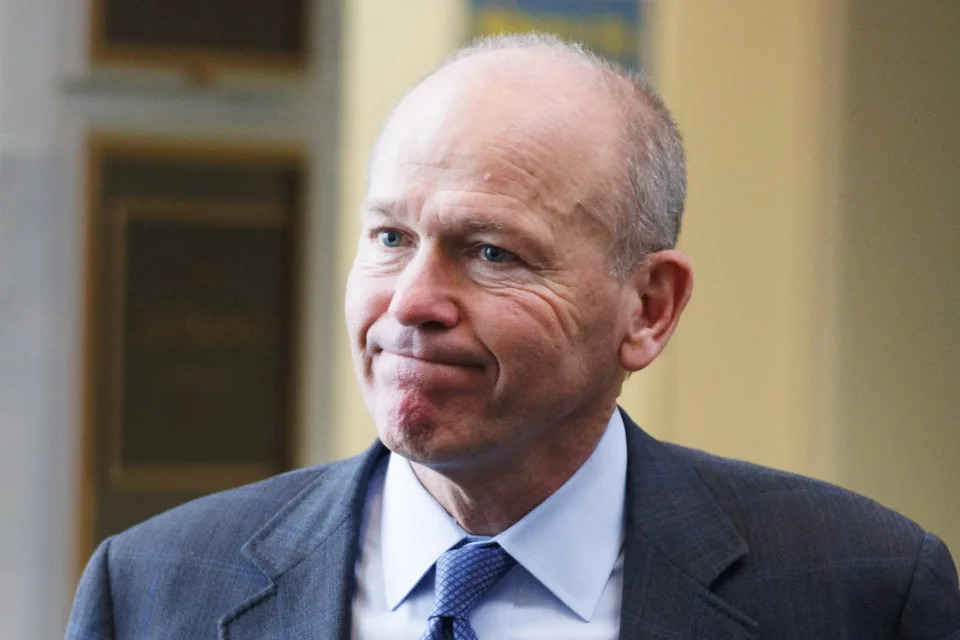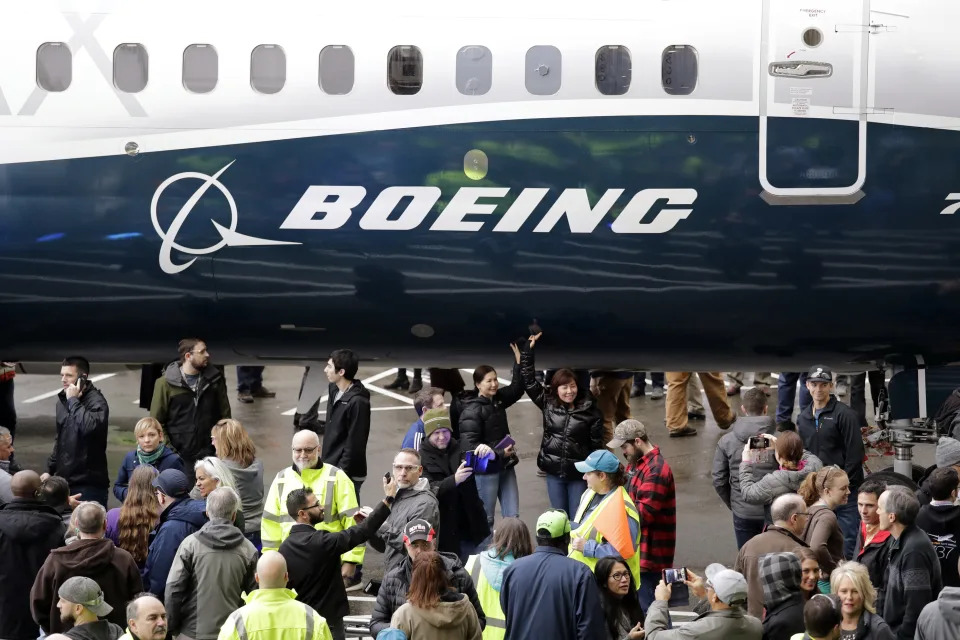Disgruntled Boeing investors take aim at $33 million pay for ex-CEO amid ongoing safety issues
DON'T HOLD YOUR BREATHE

Fortune· Aaron Schwartz—NurPhoto via Getty Images
Marco Quiroz-Gutierrez
Fri, May 17, 2024
Boeing shareholders pulled no punches at the aviation manufacturers’ shareholder meeting on Friday, asking the board how it could justify the CEO’s $33 million compensation plan and whether Boeing’s culture can reorganize itself around safety in the manufacturing process.
The concerns from investors offer a behind-the-scenes view of the battle Boeing has been waging on all fronts: A whistleblower testified before Congress last month that he was told to “shut up” after raising safety concerns in meetings; two Boeing whistleblowers died in succession; CEO Dave Calhoun is leaving at the end of the year and there is no readily apparent successor to take his place; other airlines are seeking repayment from Boeing for late aircraft deliveries; and, the Justice Department is considering pursuing charges of fraud against the company. On top of that, the stock price is down 29% year-to-date, making Boeing the second-worst performing company in the S&P 500 index.
The timing almost couldn’t be worse for Friday’s annual shareholder meeting and Boeing stuck to crisis management 101—Chairman Steven Mollenkopf remained calm but offered almost no real details about the progress of the company’s CEO search.
Still, shareholders exacted their toll, firing off sharply worded questions about the board’s effectiveness and its key decisions—an uncomfortable position for a company that boasts a slew of current and former CEOs from such Fortune 500 companies as Amgen, Carrier Global, Duke Energy, and others in private equity.
A Boeing spokesperson declined to comment to Fortune on the pointedness of the questions.
One investor asked about the process for finding a new CEO to lead the complex $112 billion company. Mollenkopf, who is leading the search, said almost nothing about timing or criteria but stated that he had been meeting with investors and customers for feedback.
“We will announce the new CEO once we have completed a thorough and thoughtful process,” he said.
Calhoun read prepared remarks aloud. He said Boeing has added more quality controls, including at its suppliers. In response to a shareholder question about safety, Calhoun added that the company is increasing training for new employees and simplifying some of its processes to help avoid defects. Whistleblowers have reported a culture of retaliation at Boeing for those who raise safety issues, but Calhoun added that the company is addressing it with investigations and stricter enforcement of its non-retaliation policy.
“We will measure our progress one airplane at a time,” he said in the prepared remarks.
While management proposals are usually rubber-stamped with unanimous support, shareholder opposition began even before the meeting, ramping up the difficulties the embattled airplane manufacturer has contended with following a January incident in which a door plug flew off an Alaska Airlines plane mid-flight. Following the Alaska debacle, Boeing dramatically revamped its comp plan to incentivize executives for safety and quality and paid zero bonus to Calhoun at his request, according to the company’s proxy statement.
But it wasn’t enough for at least some of its shareholders.
Ahead of the meeting, some investors protested against Calhoun’s reelection to the board and the approval of his $33 million compensation package. Proxy adviser Glass Lewis & Co. recommended that shareholders vote against Calhoun’s reelection, along with two other directors, Akhil Johri and David Joyce, who chair Boeing’s audit and aerospace safety committees, respectively.
Glass Lewis said a vote against Calhoun and the other directors would, “strongly signal dissatisfaction with the Company's oversight of its safety culture and its efforts to transform said culture, which, in our view, have not progressed quickly enough…”
Proxy Adviser Institutional Shareholder Services (ISS) recommended shareholders vote against Calhoun’s giant compensation package because of the large increase he saw last year, Bloomberg Law reported. Calhoun’s pay jumped 45% to $32.8 million, according to the company’s proxy statement.
“While the committee provided rationale, it was not viewed as particularly compelling for such a significant increase, especially given two other recent increases since Calhoun became CEO in 2020.”
Despite the objections, both proposals were approved, based on the preliminary results at the meeting.
This story was originally featured on Fortune.com
Boeing shareholders approve CEO's compensation as company faces investigations, possible prosecution

A Boeing 737 MAX 7 is displayed during a debut for employees and media in Renton, Wash. Boeing holds a virtual shareholders' meeting on Friday, May 17, 2024, as it deals with multiple federal investigations, frustrated airline customers and disappointing financial results.

A Boeing 737 MAX 7 is displayed during a debut for employees and media in Renton, Wash. Boeing holds a virtual shareholders' meeting on Friday, May 17, 2024, as it deals with multiple federal investigations, frustrated airline customers and disappointing financial results.
(AP Photo/Elaine Thompson, File)
DAVID KOENIG
Updated Fri, May 17, 2024,
Boeing shareholders on Friday approved CEO David Calhoun's $32.8 million compensation and heard leaders explain what the troubled aircraft maker is doing to improve the quality and safety of its planes after a door plug blew off a Boeing 737 Max jetliner in January.
Calhoun said the company is finishing a 90-day plan for fixing its manufacturing problems — a report the Federal Aviation Administration demanded after the door-plug blowout.
The CEO added that the company is still working to complete an acquisition of key supplier Spirit AeroSystems, but he gave no deadline for completion. Spirit makes fuselages for Max jets and has been a source of manufacturing flaws.
The shareholder meeting was conducted online and heavily scripted. A moderator posed a handful of shareholder questions, which Calhoun and Steven Mollenkopf, the new chairman of Boeing's Board of Directors, fielded by seeming to read their answers. None of the questions were too pointed.
Shareholders approved an advisory measure on executive compensation by a 64%-36% margin — nearly all of Calhoun's pay for 2023 was in stock awards — and rejected shareholder resolutions dealing with subjects such as pay gaps for women and people of color, and the company's ties to China.
All 11 nominees to the board were approved. Calhoun got the second-lowest support, at 78%, with former GE Aviation CEO David Joyce last at 67%.
The company has lost more than $23 billion — including $2.2 billion last year — since Calhoun took over as CEO in January 2020, mostly related to a pair of deadly 737 Max crashes that occurred in Indonesia and Ethiopia while he was on the board but before he became chief executive.
Through Thursday, the shares had fallen 27% since the door plug accident during an Alaska Airlines flight over Oregon.
“Our CEO was paid $33 million last year for failure,” said James McRitchie of CorpGov.net, an activist shareholder who presented an unrelated resolution during Friday's online meeting.
Calhoun announced in March that he would step down at the end of the year. Another shareholder said Calhoun should leave immediately.
Boeing was made the subject of multiple investigations after the door plug blowout. It could also face criminal prosecution for allegedly violating terms of a settlement with the Justice Department after the Max crashes in 2018 and 2019, which killed 346 people. The company has fallen far behind European rival Airbus — the world's other major manufacturer of large passenger jets — in sales and deliveries.
Mollenkopf said the months and years ahead are critical “as we take the necessary steps to regain the trust lost in recent times.”
“The world needs a healthy, safe and successful Boeing, and the board is going to make sure that is what it's going to get,” he said.
DAVID KOENIG
Updated Fri, May 17, 2024,
Boeing shareholders on Friday approved CEO David Calhoun's $32.8 million compensation and heard leaders explain what the troubled aircraft maker is doing to improve the quality and safety of its planes after a door plug blew off a Boeing 737 Max jetliner in January.
Calhoun said the company is finishing a 90-day plan for fixing its manufacturing problems — a report the Federal Aviation Administration demanded after the door-plug blowout.
The CEO added that the company is still working to complete an acquisition of key supplier Spirit AeroSystems, but he gave no deadline for completion. Spirit makes fuselages for Max jets and has been a source of manufacturing flaws.
The shareholder meeting was conducted online and heavily scripted. A moderator posed a handful of shareholder questions, which Calhoun and Steven Mollenkopf, the new chairman of Boeing's Board of Directors, fielded by seeming to read their answers. None of the questions were too pointed.
Shareholders approved an advisory measure on executive compensation by a 64%-36% margin — nearly all of Calhoun's pay for 2023 was in stock awards — and rejected shareholder resolutions dealing with subjects such as pay gaps for women and people of color, and the company's ties to China.
All 11 nominees to the board were approved. Calhoun got the second-lowest support, at 78%, with former GE Aviation CEO David Joyce last at 67%.
The company has lost more than $23 billion — including $2.2 billion last year — since Calhoun took over as CEO in January 2020, mostly related to a pair of deadly 737 Max crashes that occurred in Indonesia and Ethiopia while he was on the board but before he became chief executive.
Through Thursday, the shares had fallen 27% since the door plug accident during an Alaska Airlines flight over Oregon.
“Our CEO was paid $33 million last year for failure,” said James McRitchie of CorpGov.net, an activist shareholder who presented an unrelated resolution during Friday's online meeting.
Calhoun announced in March that he would step down at the end of the year. Another shareholder said Calhoun should leave immediately.
Boeing was made the subject of multiple investigations after the door plug blowout. It could also face criminal prosecution for allegedly violating terms of a settlement with the Justice Department after the Max crashes in 2018 and 2019, which killed 346 people. The company has fallen far behind European rival Airbus — the world's other major manufacturer of large passenger jets — in sales and deliveries.
Mollenkopf said the months and years ahead are critical “as we take the necessary steps to regain the trust lost in recent times.”
“The world needs a healthy, safe and successful Boeing, and the board is going to make sure that is what it's going to get,” he said.
No comments:
Post a Comment